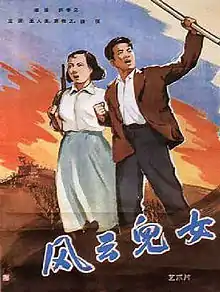Children of Troubled Times
Children of Troubled Times, also known as Fēngyún Érnǚ, Scenes of City Life, Children of the Storm, and several other translations, is a patriotic 1935 Chinese film most famous as the origin of "The March of the Volunteers", the national anthem of the People's Republic of China. The movie was directed by Xu Xingzhi and written by Tian Han and Xia Yan. Yuan Muzhi plays an intellectual who flees the trouble in Shanghai to pursue the glamorous Wang Renmei only to join the Chinese resistance after the death of his friend.
| Children of Troubled Times | |||||||||
|---|---|---|---|---|---|---|---|---|---|
 | |||||||||
| Chinese name | |||||||||
| Traditional Chinese | 風雲兒女 | ||||||||
| Simplified Chinese | 风云儿女 | ||||||||
| Literal meaning | Storm Sons [&] Daughters Children of the Storm | ||||||||
| |||||||||
| Directed by | Xu Xingzhi | ||||||||
| Written by | Tian Han Xia Yan | ||||||||
| Starring | Yuan Muzhi Wang Renmei | ||||||||
Production company | |||||||||
Release date | 24 May 1935 | ||||||||
| Country | China | ||||||||
| Language | Mandarin | ||||||||
Plot
A young poet Xin Baihe flees Shanghai with his friend, Liang. Liang soon joins the resistance against the Japanese invaders, but Xin chooses to pursue a relationship with a glamorous and westernized widow in Qingdao.
After hearing that Liang has been killed, however, Xin has a change of heart and rushes to join the war effort.
Communist themes
The film was a strong communist production, produced by the Diantong Film Company and based on a story by Tian Han, a Communist Party member since 1932. Tian was arrested by the Nationalists shortly after it was released. In addition, it starred Yuan Muzhi, who would join the Communists in 1940 and had music by the Communist composer Nie Er.[1]
The story itself, with its tale of a wealthy man who learns to abandon the decadence of Western culture for self-sacrifice, was also a common theme among leftist films of the period.
Theme
The theme song of the movie, "The March of the Volunteers", was sung by Gu Menghe and Yuan Muzhi. The song was released as an album by the Pathé Records label (which later became part of EMI in 1935). "The March of the Volunteers" was selected as the provisional national anthem of the People's Republic of China in 1949.[2] This decision was formally written into the Constitution of the People's Republic of China in March 2004.
See also
Notes
- Pickowicz, 64
- Pickowicz, 65
References
- Pickowicz, Paul G. (Jan 1991), "The Theme of Spiritual Pollution in Chinese Films of the 1930s", Modern China, 17 (1): 38–75, doi:10.1177/009770049101700102, S2CID 144631565
External links
- Children of Troubled Times at the Internet Movie Database [erroneously translated as Scenes of City Life]
- Children of Trouble[d] Times at Dianying's Chinese Movie Database
- Children of Troubled Times at the Internet Archive
- A short clip with the early version of "March of the Volunteers" on YouTube